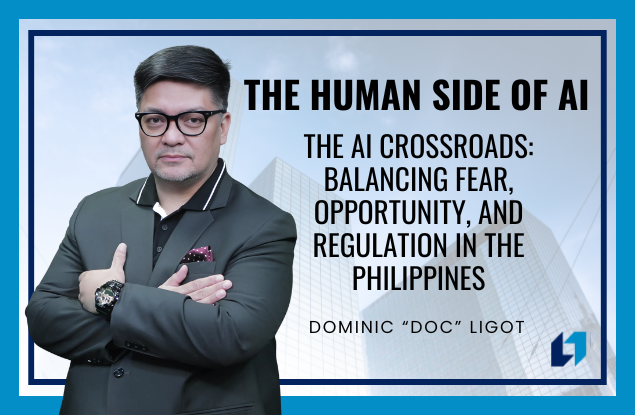Artificial Intelligence (AI) is reshaping industries at a pace not seen since the dawn of the internet. Yet as with any transformative technology, the debate around AI in the Philippines has become lopsided, dominated by fears of job loss, disinformation, and cheating, while underplaying the extraordinary opportunities AI offers for growth, productivity, and creativity. For investors and policymakers, the challenge is not whether AI will disrupt society, it already is, but whether we will embrace it responsibly or allow overregulation to leave us behind.
Jobs: From Disruption to Augmentation
Headlines predicting a “job apocalypse” from AI automation make for easy clickbait, but they ignore the more nuanced reality. Yes, certain roles will be replaced, but far more are likely to be transformed. Generative AI (GenAI) excels at repetitive, mundane tasks, creating space for workers to focus on creative, analytical, and higher-value activities.
In healthcare, AI can process vast medical datasets so doctors spend more time with patients rather than paperwork. In manufacturing, AI can optimize workflows, boosting efficiency while freeing employees to focus on quality and innovation. This is not about replacement, it’s about augmentation. For a developing economy like the Philippines, that distinction could mean the difference between stagnation and leapfrogging into a new productivity era.
Creativity: Disinformation or New Frontiers?
Deepfakes and disinformation understandably dominate much of the conversation. The risk is real: erosion of trust in media, politics, and even everyday communication. But again, the narrative misses the broader picture. For creatives, artists, writers, musicians, GenAI is less a threat than a catalyst.
It can accelerate brainstorming, generate design concepts, and open entirely new artistic frontiers. Imagine a Filipino filmmaker using AI to storyboard ideas at lightning speed, or local game developers leveraging AI to compete globally with richer, more immersive experiences. Properly harnessed, GenAI can give Filipino creatives a competitive edge in the global digital economy.
Education: Cheating vs. Personalization
The anxiety over students “outsourcing” their homework to AI tools is not misplaced. But just as calculators didn’t destroy mathematics, AI won’t destroy learning. Instead, it could personalize education in unprecedented ways, tailoring lessons to student needs, offering real-time feedback, and relieving teachers of administrative burdens. For a country long plagued by educational inequality, this is a chance to democratize access to quality learning at scale.
The Regulatory Fork in the Road
But here lies the crux: regulation. Around the world, governments are scrambling to catch up with AI’s rapid evolution. While safeguards are necessary, there is a real danger that the Philippines could respond with sweeping, draconian rules that suffocate innovation before it matures.
An overly restrictive regime could lock us into the role of AI consumers rather than producers, permanently setting the country back in adoption and competitiveness. Investors should pay close attention: the regulatory choices made in the next 12–18 months will determine whether the Philippines becomes a hub for AI-driven industries or a bystander watching neighbors reap the rewards.
Conclusion
Disruption always triggers fear, but fear alone is not a strategy. The Philippines stands at an AI crossroads. We can frame the conversation around risk and lock ourselves into stagnation, or we can take a balanced approach: mitigating legitimate concerns while enabling innovation.
For policymakers, businesses, and investors alike, the imperative is clear. Thoughtful, forward-looking regulation, not reactionary clampdowns, will decide whether AI becomes a driver of long-term prosperity or a missed opportunity.
Dominic “Doc” Ligot is one of the leading voices in AI in the Philippines. Doc has been extensively cited in local and global media outlets including The Economist, South China Morning Post, Washington Post, and Agence France Presse. His award-winning work has been recognized and published by prestigious organizations such as NASA, Data.org, Digital Public Goods Alliance, the Group on Earth Observations (GEO), the United Nations Development Programme (UNDP), the World Health Organization (WHO), and UNICEF.
If you need guidance or training in maximizing AI for your career or business, reach out to Doc via https://docligot.com.
![]()



